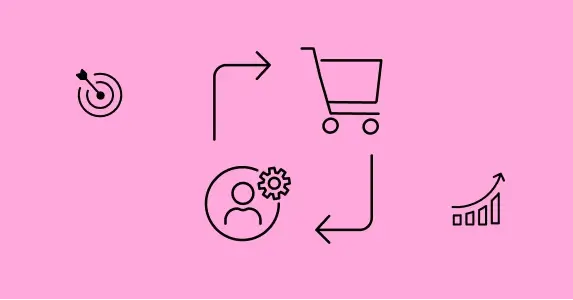What if your ecommerce brand could predict what customers want, before they even ask? In 2026, the brands winning customer loyalty aren’t just personalizing offers—they’re using behavioral science to understand the psychological drivers behind every decision. By aligning the shopping experience with these subconscious cues, ecommerce leaders are creating journeys that feel intuitive, engaging, and persuasive. Take Netflix: with over 150 A/B tests annually, it fine-tunes recommendations to each viewer, proving the power of micro-personalization at scale.
This guide outlines how to utilize behavioral insights to optimize conversion rates from browsers to buyers and implement personalization strategies that generate sustainable, profitable growth. Our comprehensive guide will include:
- What is Ecommerce personalization?
- The importance of delivering a personalized customer experience.
- Benefits of Ecommerce personalization and how to begin.
- Key use cases and examples of Ecommerce personalization.
- Trends, statistics, and best practices in Ecommerce personalization.
- Top Ecommerce personalization platforms.
What Is Ecommerce Personalization?
Ecommerce personalization is about creating a rich, tailor-made experience for your audience and customers.
It’s critical to note that personalization is not limited to one point in marketing and sales. Instead, it is applicable across the various stages of a customer’s journey and interaction with your ecommerce brand.
To understand ecommerce personalization in-depth, let’s first rule out the most common misconception that plagues it. Ecommerce personalization is not just about random recommendations shown to every website visitor that you think your customer will appreciate.
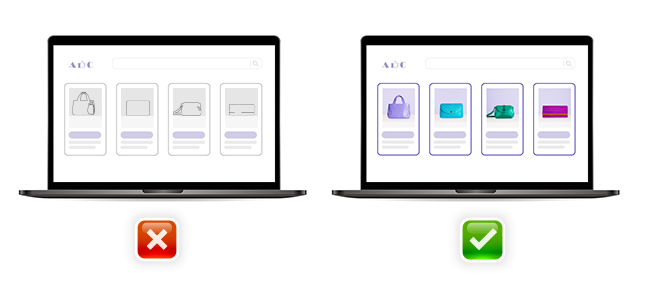
A visual representation of how ecommerce personalization works
Instead, a whole range of data input and analysis goes into personalizing your ecommerce website so that your customers can get contextual recommendations and relevant products.
A customer’s purchase history, region, age, gender, personal preferences, interactions with the products on your website and different social media platforms, and transaction value are some of the inputs that are roped in while creating a personalization strategy.
All these variables and parameters might seem overwhelming at a glance. You might think that one needs extensive knowledge about machine learning and AI to develop these strategies. Well, this holds true when you consider creating an in-house team.
Importance of Delivering a Personalized Customer Experience
A personalized shopping experience is critical for your brand and even more for your customers. Non-personalized websites are less adept at converting and retaining customers. In fact, 80% of customers are more likely to purchase from a brand that offers them personalized experiences.
Having a strategic approach to ecommerce personalization is no longer a luxury but now a standard expectation by customers to stand out at all touchpoints. This will also boost your brand’s bottom line, which is why ecommerce personalization will be critical for business success.
And now, with the availability of proficient AI-powered personalization platforms that make personalization precise and hassle-free, there’s no reason why any ecommerce brand should risk its profitability.
Let’s see why we say ecommerce personalization is a game-changer.
1. Meeting Customer Expectations
The importance of personalization from a customer’s point of view cannot be understated.
A research survey revealed that 44% of the participants were willing to revisit their ecommerce retailers if they offered a personalized shopping experience. Not just that, more than 70% of the customers were displeased when a website lacked these features.
In addition, customers are more likely to lose interest while shopping and drop off if they are unable to find the right product. Personalization strategies, as we see, have a direct (and significant) impact on customer retention rates.
91% of customers prefer to shop from brands that provide relevant offers and recommendations. Non-personalized ecommerce websites, on the other hand, are a perfect recipe for turning your customers away, more often than not, to your competitors.
2. Reduced Product Returns
Unlike brick-and-mortar stores, the return of products bought from an ecommerce website can be a hassle for both the retailer and the customer. Often, customers may be unsatisfied with the product after impulsively buying it during the sale.
However, a personalized sales strategy improves the customer’s shopping experience and satisfaction levels.
Ecommerce Personalization: Benefits + How to Start
Ecommerce personalization is no longer nice to have. It has very well catapulted into a necessity. Your customers are looking for a personalized experience, and there’s enough data to prove that the absence of personalization can drive them away.
The result? Cart abandonment, low customer conversion and retention rate, high customer churn rate, low customer lifetime value, and more.
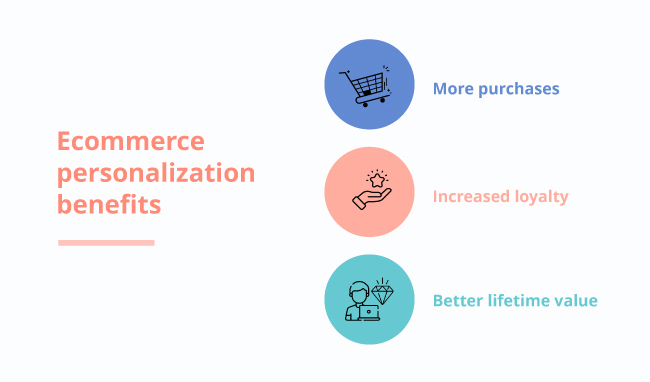
Illustrating the benefits of ecommerce personalization
On the contrary, ecommerce personalization can result in the opposite. Let’s see how.
1. Increase in Average Order Value (AOV)
Ecommerce personalization = more purchases. How?
Personalized recommendations and offers significantly increase the average order size (AOV) and cart value. In a survey, more than 49% of the participants bought a product that they had not planned to buy due to personalized recommendations.
Delivering contextual recommendations based on behavioral data helps cross-sell and upsell complementary products and may lead to more purchases.
You can also send personalized offers and discounts to your customers to keep cart abandonment in check and reward loyal customers. These offers and discounts also enhance customer engagement and translate into more purchases.
2. Increased Customer Loyalty
E-commerce personalization is a surefire way of increasing customer loyalty. This is because customers only become loyal to a brand they completely trust.
80% of customers say they are more likely to purchase from a brand that offers personalized experiences. They trust a brand when they feel it cares for its customers and understands their preferences.
As a brand, you must also reward your customers for their prolonged loyalty by providing them with special access and limited-time offers. The gamification of the action and reward system helps you retain your customers in the long run.
3. Better Lifetime Value (LTV)
Increased customer loyalty directly equates to more regular purchases and revisits to your website. Members from loyalty programs generate 12% to 18% more incremental revenue. Due to a higher retention rate, the lifetime value of your customers also increases significantly.
These customers create a fixed inflow of cash. In addition, your loyal customers are more likely to recommend your product to close friends and family, increasing your reach.
4. Distinguishing your Brand
In a crowded market like ecommerce, your brand is the ultimate differentiator. What will differentiate your brand from the rest are the personalized experiences that are crafted for customers.
Brands that go the extra mile to cater to customer preferences are the ones that stand apart and get noticed. This helps in better brand recall and word-of-mouth recommendations that enhance trust in the minds of customers.
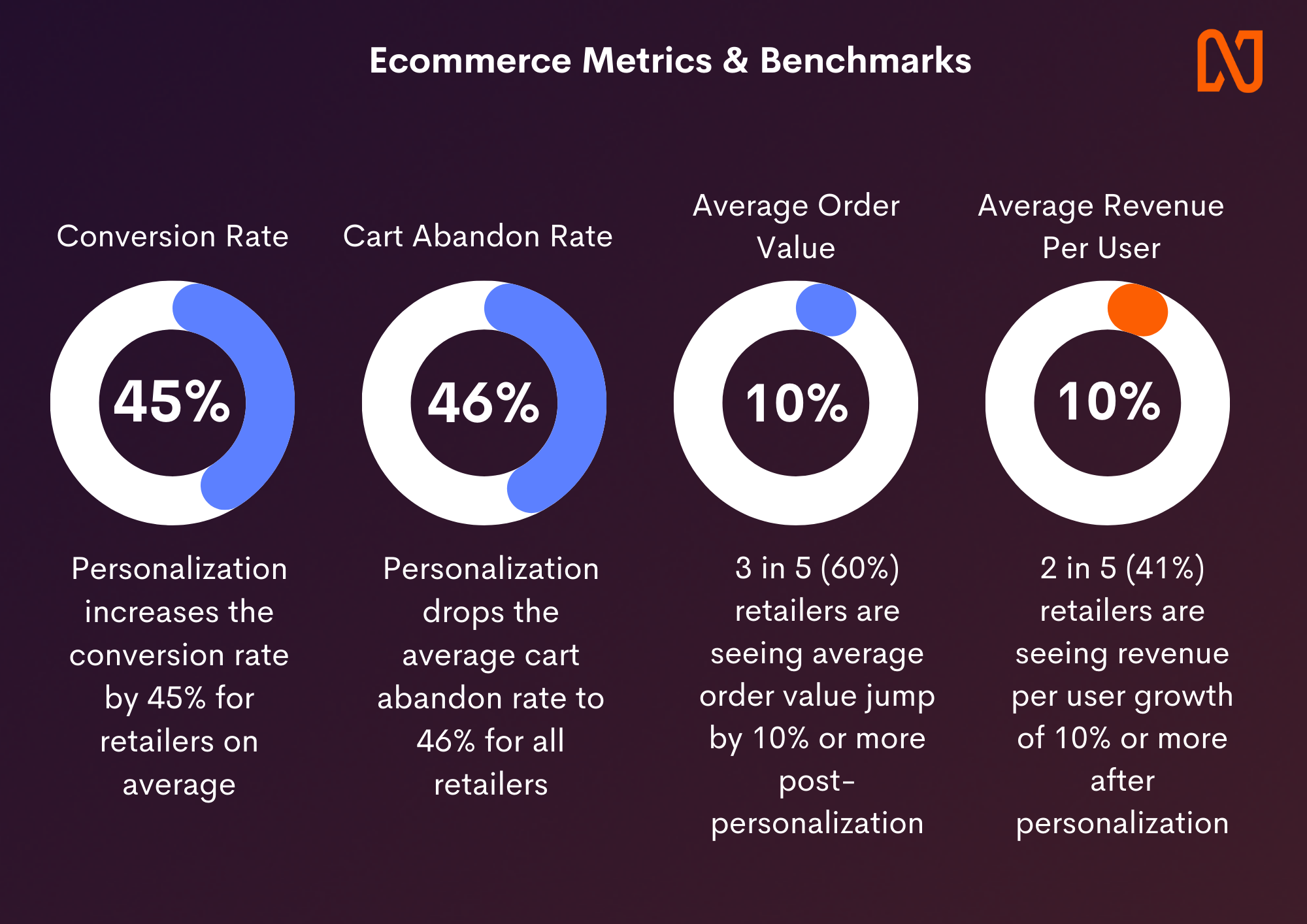
Building an Effective Ecommerce Personalization Strategy
To build an effective ecommerce personalization strategy, start by collecting customer data and segmenting users based on behavior, preferences, and purchase intent. Use predictive models to anticipate actions like churn or conversion, and personalize experiences across the entire journey—from website to WhatsApp. An advanced ecommerce personalization platform like Netcore simplifies this by unifying data, enabling AI-powered targeting, and automating omnichannel engagement.
The result: higher conversions, greater customer loyalty, and scalable revenue growth through meaningful, one-to-one experiences at every touchpoint.
Tips or Tactics to Implement Ecommerce Personalization
1. AI-driven Personalization
The number of ecommerce websites has increased exponentially over the years.
With high competition and higher customer expectations, it isn’t feasible for marketers to manually create segments, analyze, set triggers, and recommend products by going through hundreds, if not thousands, of data points. The great news is that AI eliminates this need for manual efforts and helps ace ecommerce personalization.
And that’s precisely what Netcore’s ecommerce marketing platform offers.
AI and neural network technologies can easily collate large amounts of data and find patterns in a customer’s behavior in a way that easily supersedes manual human abilities. AI then curates and extends a personalized experience based on this data.
The data includes purchase history, interaction with the website and social media channels, transactions, and the behavioral history of the customers.
Some might think that AI-powered personalized recommendations might not work for first-time customers.
However, this is not the case, as the interaction history of customers is also collected from various social media platforms. The AI system can make suggestions based on those. Platforms like Netcore effortlessly implement such scalable AI integration.
To help you gauge the power of AI-driven personalization, let’s see an overview of what Netcore’s Co-marketer AI engine does.
First, it thoroughly understands each customer’s wants by analyzing large sets of historical and real-time data. In addition, its image recognition capability helps it learn from each user’s search, browsing, and purchase behavior. The result? Hyper-contextual recommendations that convert.
2. Omnichannel Personalization
The first rule to effective ecommerce omnichannel personalization is to understand that it doesn’t end at your website.
However, personalized touchpoints are offered by less than half of the retail brands. Personalization works best when your entire channel mix is optimized to deliver personalized recommendations.
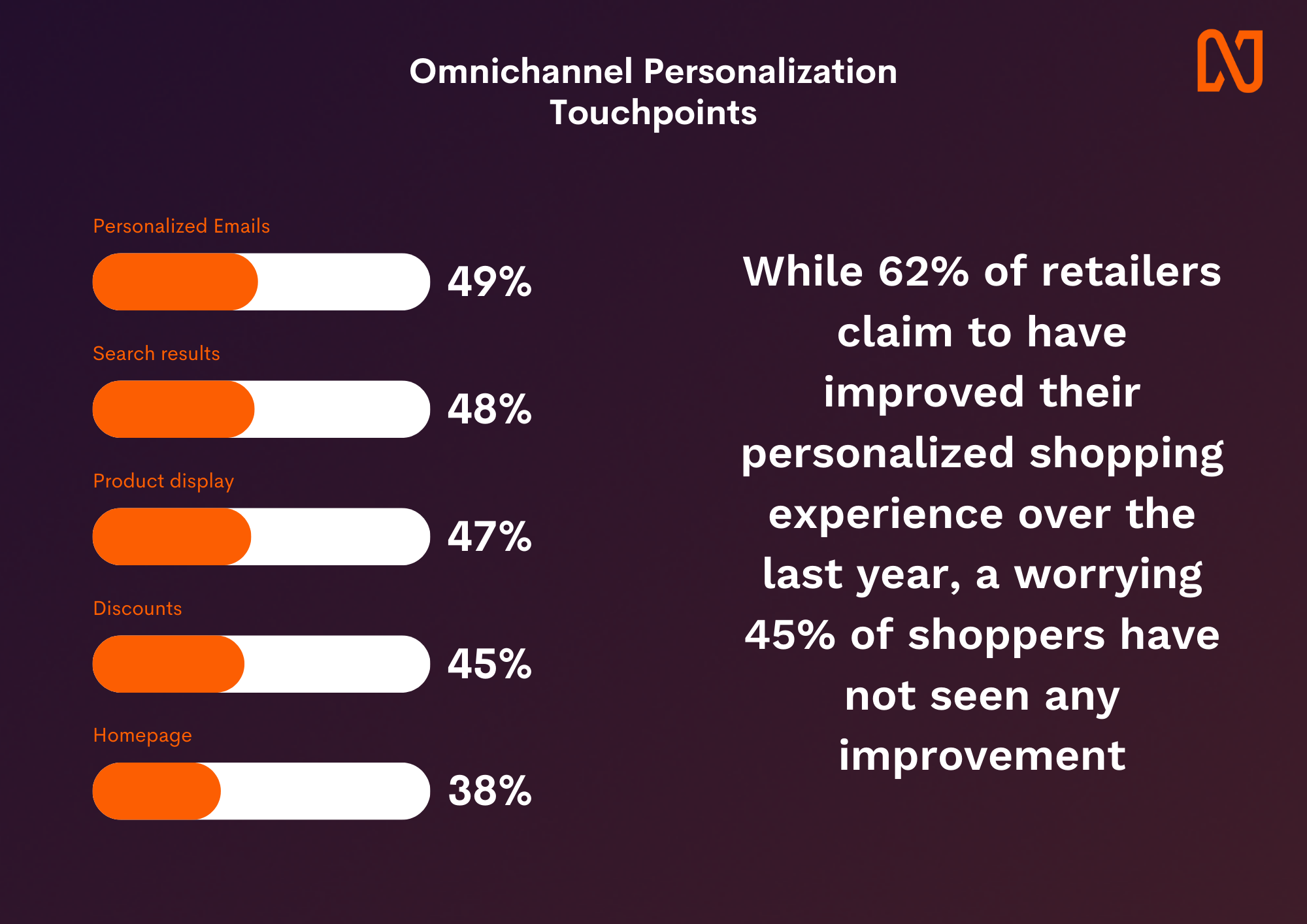
When done right, omnichannel personalization can increase CTRs by 30-60% and Add-to-cart rates by 6-9%, among other success metrics. Learn more about Omnichannel for ecommerce personalization.
3. Cart Abandonment Campaigns
Send abandon cart reminders to customers on their preferred communication channel. You can personalize the message using Co-marketer that is being delivered, such as their names and the items they left on the cart, goes a long way in delivering a good experience. You can further incentivize them to complete the purchase by offering discounts or free shipping and delivery charges.
4. Let Users Pick up Where They Left Off
To decrease cart abandonment, implement a feature that sends reminders with the items already in their cart when users return to your site without completing their purchase. This kind of user journey will help reduce drop-offs. Common examples are ‘Continue Shopping’ and ‘Pick up where you left’ help with increasing conversion rates and result in more sales.
5. Website Personalization
Customize the website experience for customers based on their past interactions, purchases and behavior to improve the chances of conversion.
While 67% of retailers claim they excel in personalizing their online website, only 34% of consumers would agree to this point. This is a leading indicator for brands to capitalize on this opportunity as customers are looking to be served with personalized experiences in their shopping journey.
What Are Some Use Cases or Examples of Ecommerce Personalization?
Brands can practice ecommerce personalization in a multitude of ways. With a robust ecommerce marketing platform, brands can implement personalization strategies that will launch them significantly ahead in the game. Here are 7 examples.
Each one of these examples is backed by data and a thorough problem-solving approach. Let’s dive in.
1. Chumbak’s Recommendation widget with personalized products
A recommendation widget is a widget that shows up with recommended products while browsing. The widget is useful for upselling, down-selling, and cross-selling products to your customers across their journey.
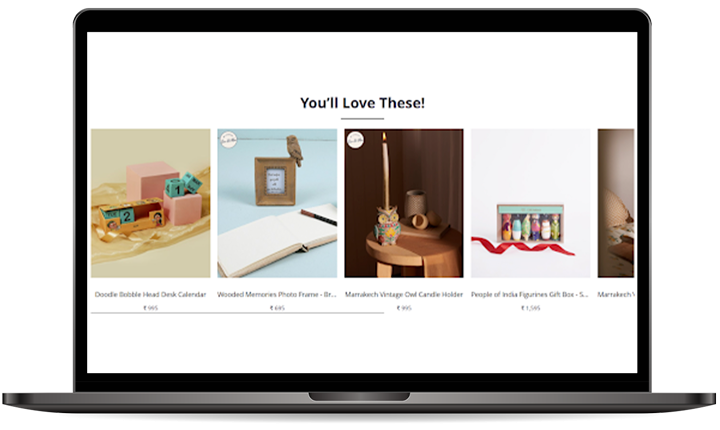
Chumbak offered a wide range of products available on its platform. However, customers found it hard to navigate and find their desired products.
Implementing Netcore’s personalization platform powered by AI helped Chumbak show more personalized recommendations across the home, product listing, and product display pages.
Find out how Netcore helped Chumbak increase cart contribution rate by 18%
2. Woodland’s personalized web messages
Web messages are smart messages that strategically appear on the screen when customers browse your website. They act like an attention-grabbing reminder that encourages the customer to try out a new line of products, check out an exciting offer, or try a new feature of your website.
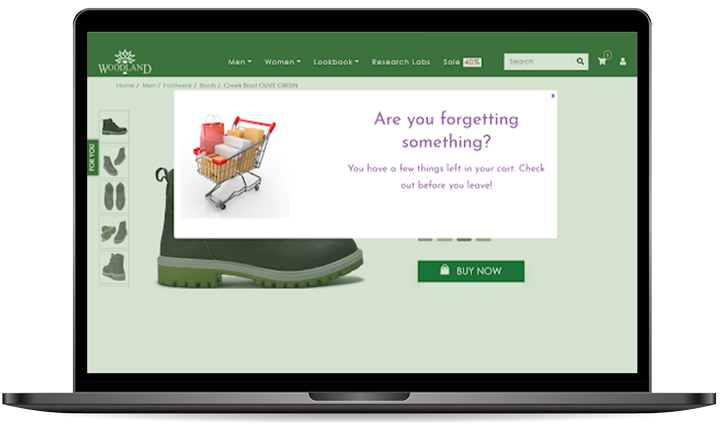
Woodland had high traffic on their website, but conversion to actual paying customers wasn’t enough. Not finding the right products also led to some customers dropping off even after signing up.
To solve this problem, Woodland worked with Netcore to implement smart web messages on their web pages. Netcore calculated the average time a visitor spent on the website before dropping off and programmed the web message to appear exactly during that time to encourage engagement.
Learn how Woodland achieved a 100% increase in purchase rate on PLP and 117% increase in add to cart rate.
Overall, 14X marketing ROI was generated.
3. Personalized boutique page implemented by Once Upon a Trunk
A personalized boutique page shows a custom storefront to each customer based on past and real-time behavior. Since these products are chosen to match shoppers’ tastes and interests, brands will see up to a 150% increase in CTR and a subsequent boost in revenue.
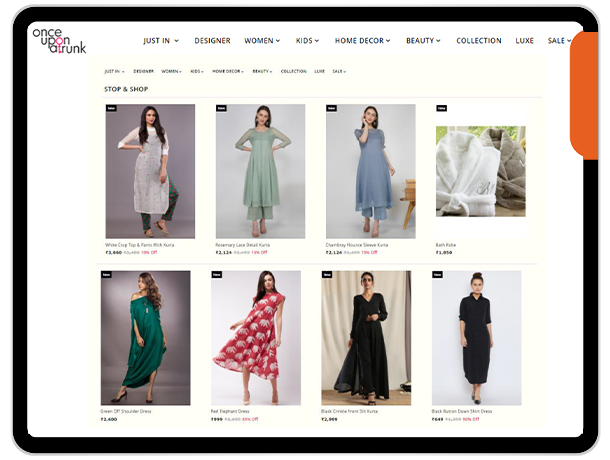
This is how personalized boutique shopping comes to life online. Observe the impact of ecommerce personalization on a real-world product page.
Leveraging Netcore’s personalization suite, Once Upon a Trunk was able to understand their customers and show them personalized recommendations. AI-led personalized product recommendation was deployed across the customer’s journey using a 1:1 recommendation strategy based on the customer’s past behaviors.
Learn the secrets to how Once Upon a Trunk achieving 28% increase in revenue within 90 days with Netcore
4. Jack & Jones’ Web notifications with personalized offers
Even though they sound similar, web notifications are not the same as web messages. Web notifications are a marketing channel that requires the user’s permission.
The opt-in prompt is usually shown by the user’s web browser. These are browser-level prompts that can appear anytime you’re connected to the internet, even while browsing other websites.
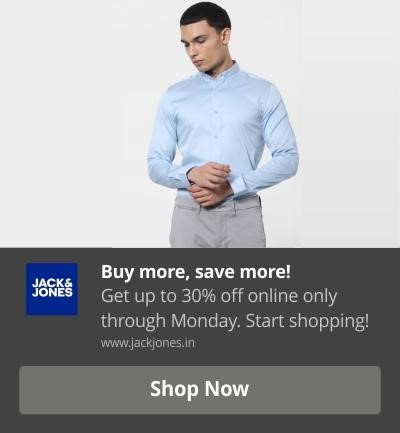
Jack & Jones intended to increase customer engagement and conversion rates on their website and wanted to extend a personalized shopping experience.
Netcore integrated web notifications in their website, which resulted in a 3.9% contribution to total products added to the cart, 2.6% contribution to total revenue through personalization, and a 25% increase in the add-to-cart rate in PLP.
5. Nykaa’s cart abandonment emails with a personalized offer
Cart abandonment emails are part of an email marketing automation strategy and are triggered when the customer abandons their cart. The system sends an email to the customer to complete their check-out process and incentivizes them by providing a limited-time personalized offer.
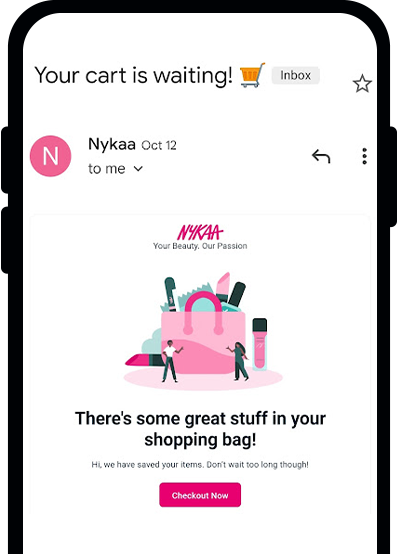
Even though Nykaa tried to optimize its email marketing strategies, it was not hitting the required benchmarks. Nykaa collaborated with Netcore to solve this problem. Leveraging the Raman AI engine, Netcore analyzed each active customer’s historical interaction, identified their preferred time to engage, and optimized the send times of email campaigns.
The result? Netcore helped Nykaa Fashion improve email open rates by 36%.
6. Vero Moda sending personalized SMS with offers
SMS offers are one of the more elementary forms of marketing without much personalization. But nowadays, with the advent of analytics, SMS offers can also be personalized to a greater extent.
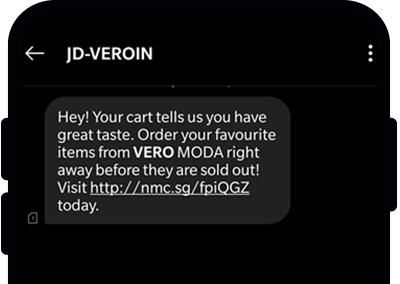
Netcore helped Vero Moda set up its multi-channel marketing strategy and increase engagement across multiple channels, including SMS. The right SMS with the right offers resulted in a 6.7% contribution to the total revenue, a 159% increase in add-to-cart rate on PLP, and a 121% increase in purchase rate on PLP.
7. Borosil’s In-app messages
In-app messages pop up while the user is using your app. Unlike push notifications, which invite users to launch the app, in-app messages target the users during their current browsing session.
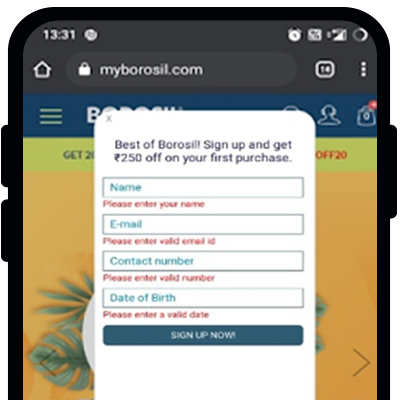
Borosil intended to increase the total number of sign-ups on their website. They worked with Netcore to implement in-app messages on their webpage. After calculating the average time a visitor spent on the website before dropping off, Netcore strategically timed the in-app message to drive sign-ups. The result? Netcore helped Borosil increase the total number of sign-ups by five times or 400%.
Ecommerce Personalization Trends, Stats and Best Practices
Sharing below top Ecommerce Personalization Trends
1. Hyper-Personalization with AI & Real-Time Data
Utilizing AI and machine learning to deliver real-time, context-aware experiences across all touchpoints. Examples include personalized product recommendations, dynamic pricing, and tailored content based on user behavior.
2. Predictive Personalization
Leveraging predictive analytics to anticipate customer needs and preferences, enabling proactive engagement strategies.
3. Privacy-Conscious Personalization
Balancing personalization efforts with data privacy concerns by emphasizing first-party data collection and transparent data usage policies.
4. Personalized Loyalty Programs
Implementing loyalty programs that offer personalized rewards and incentives based on individual customer behavior and preferences.
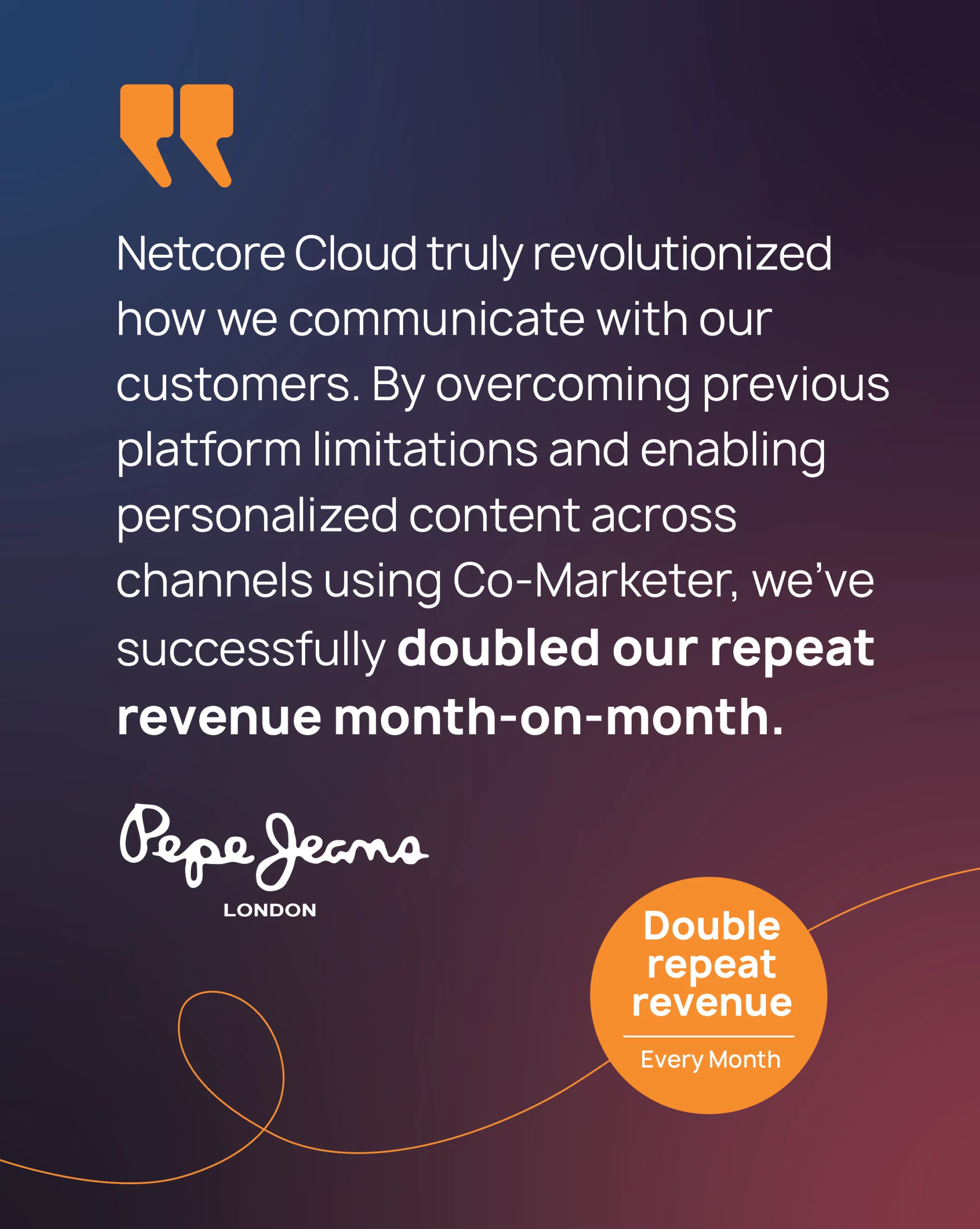
You can find more information about ecommerce personalization trends on our website. If you’re looking for ecommerce personalization ideas, you should definitely check it out.
Best Practices for Effective Personalization
- Leverage First-Party Data
Collect and utilize data directly from customer interactions to inform personalization strategies while respecting privacy regulations. - Implement AI-Driven Solutions
Adopt AI and machine learning technologies to analyze customer data and deliver personalized experiences at scale. - Ensure Consistency Across Channels
Maintain a unified personalization approach across all customer touchpoints to provide a seamless experience. - Prioritize Data Privacy and Transparency
Be transparent about data collection practices and ensure compliance with data protection regulations to build trust with customers. - Continuously Test and Optimize
Regularly assess the effectiveness of personalization strategies through A/B testing and analytics to refine approaches.
Best Ecommerce Personalization Platforms
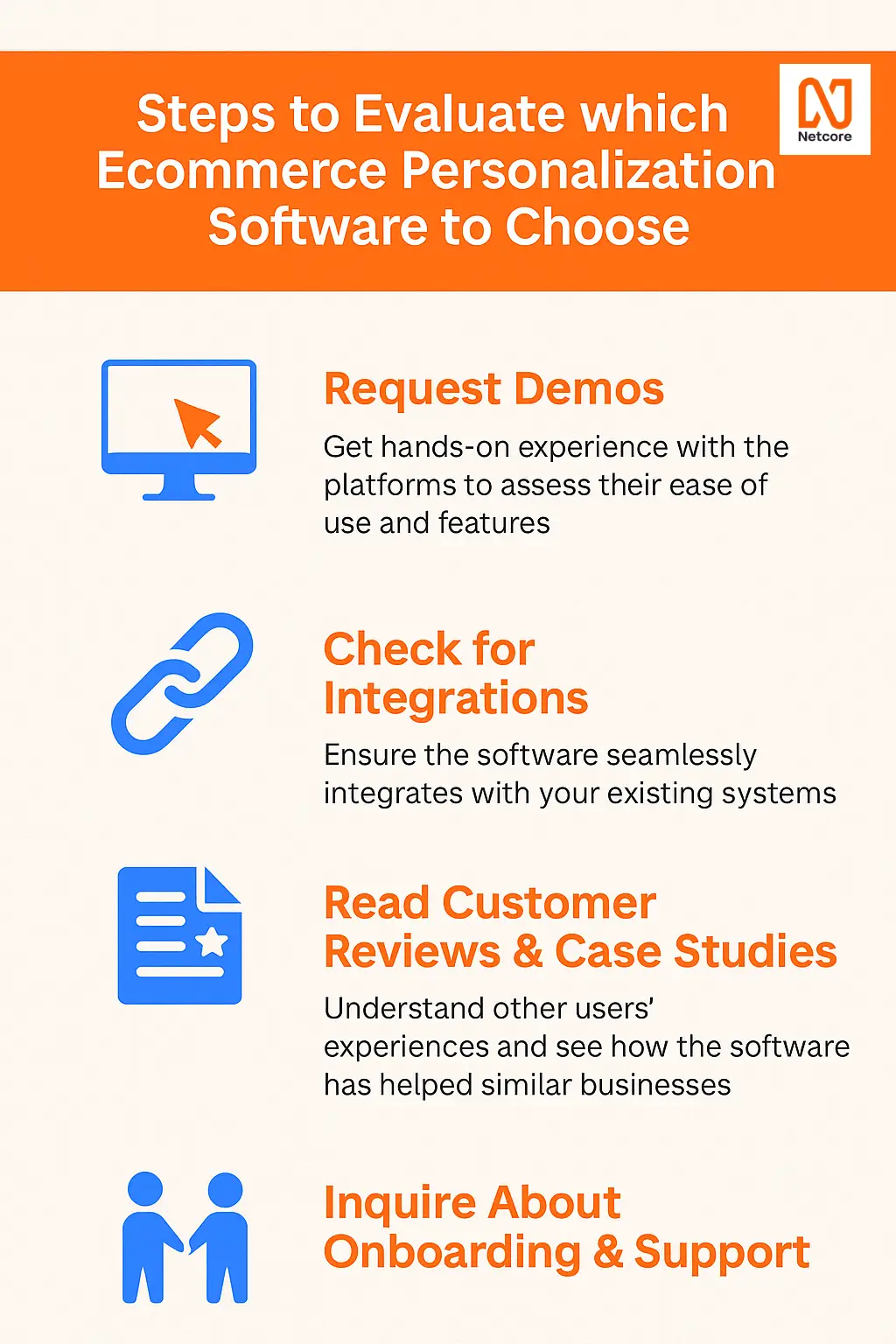
Choosing the best software for web and ecommerce personalization requires a thorough evaluation of your specific needs and the features offered by various platforms. Here’s a breakdown of how to approach this:
- Identify your objectives: What do you want to achieve with personalization? Examples include reducing cart abandonment, increasing average order value, improving customer engagement, enhancing conversion rates, or fostering customer loyalty.
- Understand your target market: Do you have distinct customer segments with different buying behaviors, interests, and needs? Personalization is most effective when you can tailor experiences to these segments.
- Assess your product catalog: Is your product range diverse? A wider variety of products often benefits more from personalized recommendations.
- Evaluate your current metrics: Do you have high bounce rates, low conversion rates, or significant cart abandonment? Personalization can help address these issues.
- Determine your personalization scope: Do you need on-site personalization, email personalization, in-app personalization, or cross-channel (omnichannel) capabilities?
- Consider your data availability: Do you have the ability to collect, analyze, and utilize customer data (browsing history, purchase history, demographics, behavior) effectively?
- Assess your technical capabilities and resources: Do you have the technical expertise to implement and manage a personalization platform, or do you need a user-friendly solution with good support?
- Establish your budget: Determine how much you are willing to invest in a personalization solution, considering initial costs, ongoing subscription fees, and potential customization or training expenses.
Learn How Netcore Drove a Meteoric Rise in Product Discovery for a 100Cr Ecommerce Brand
Ecommerce Personalization Tools or Available Software Options
Some popular options available in 2026 include:
- Netcore: Provides a range of personalization solutions, including AI-powered product recommendations & search, Agentic AI, email personalization, nudges, omnichannel marketing solutions and customer journey orchestration across multiple touchpoints. They focus on helping e-commerce brands leverage customer data for personalized experiences.
- Klaviyo: Primarily known for email marketing, but also offers strong segmentation and personalization capabilities.
- Insider: An omnichannel platform with AI-powered predictive segmentation and personalization features across various channels.
- Dynamic Yield: Offers a comprehensive personalization suite with advanced A/B testing and recommendation engines.
- HubSpot Marketing Hub: Provides personalization tools within its broader marketing automation platform, including smart content and personalized email tokens.
Conclusion
In today’s competitive market, scaling your ecommerce success demands personalized customer experiences to drive loyalty and revenue. For growing businesses managing large inventories (10,000+ SKUs), manually understanding customer needs is inefficient.
Ecommerce personalization platforms automate data analysis and campaign deployment, saving significant time and effort. Netcore partners with thousands of ecommerce brands, powering effective campaigns like upselling, cross-selling, loyalty programs, and remarketing. We leverage our extensive data-driven insights to help you refine your personalization strategy.
Scaling ecommerce personalization is crucial for growth. By using the right technology, you can create customer-centric journeys that boost engagement and sales, without getting bogged down in manual processes. To truly scale your marketing efforts, consider leveraging a robust ecommerce marketing platform.
Ready to scale your ecommerce growth through effective personalization? Book a guidance call with our experts today for tailored strategies based on our experience with thousands of ecommerce businesses.
 2 YRS IN A ROW
2 YRS IN A ROW  Netcore Named a Leader in 2025 Gartner® Magic Quadrant™ for Search & Product Discovery
Netcore Named a Leader in 2025 Gartner® Magic Quadrant™ for Search & Product Discovery 







